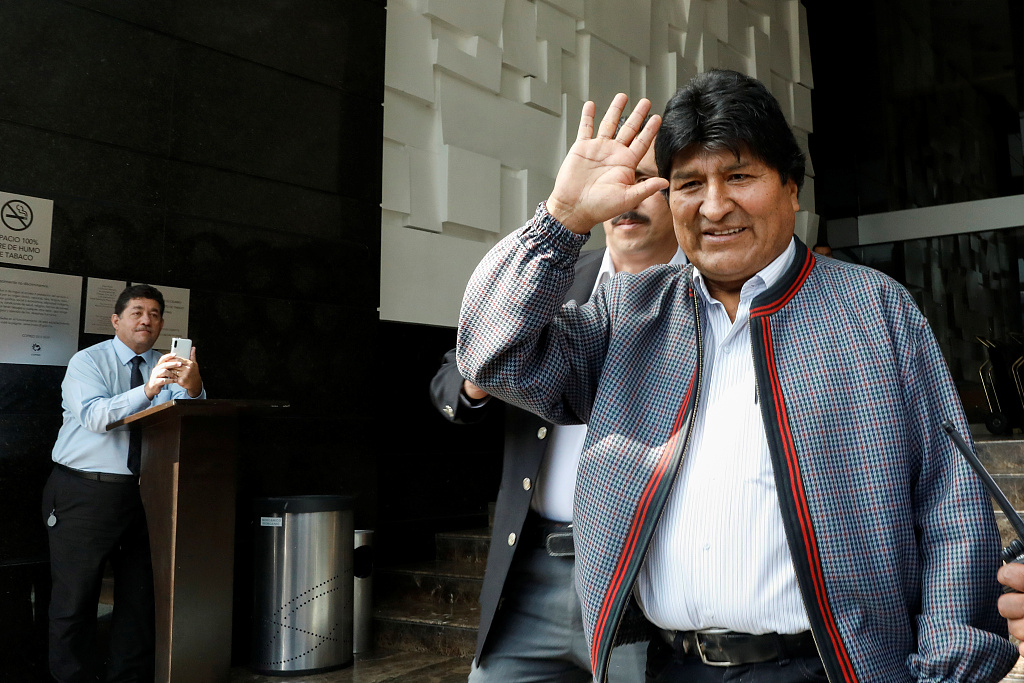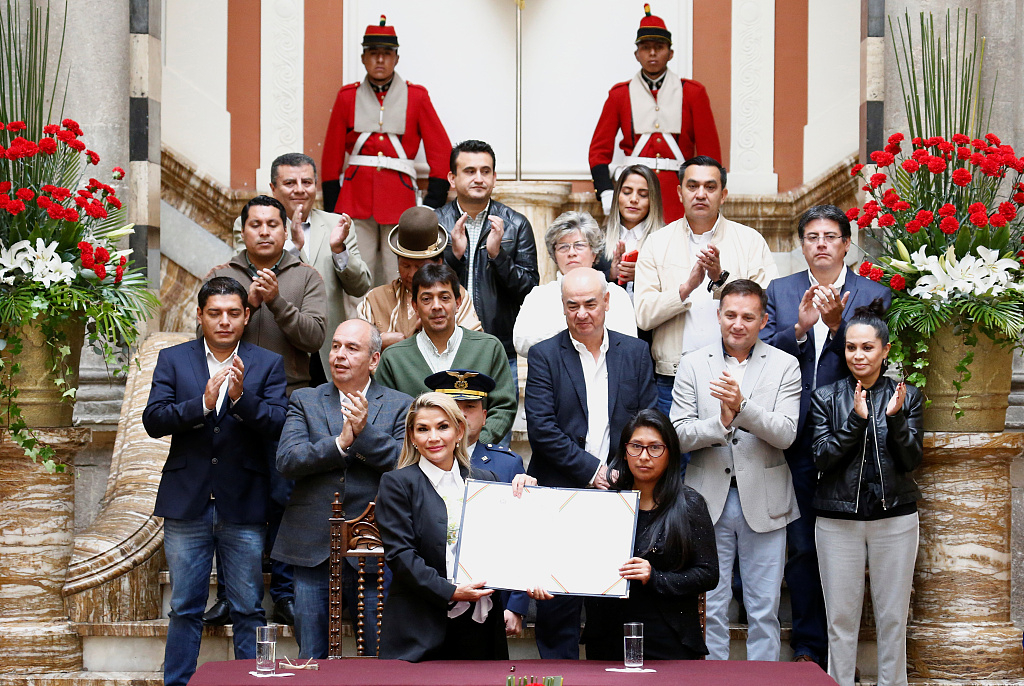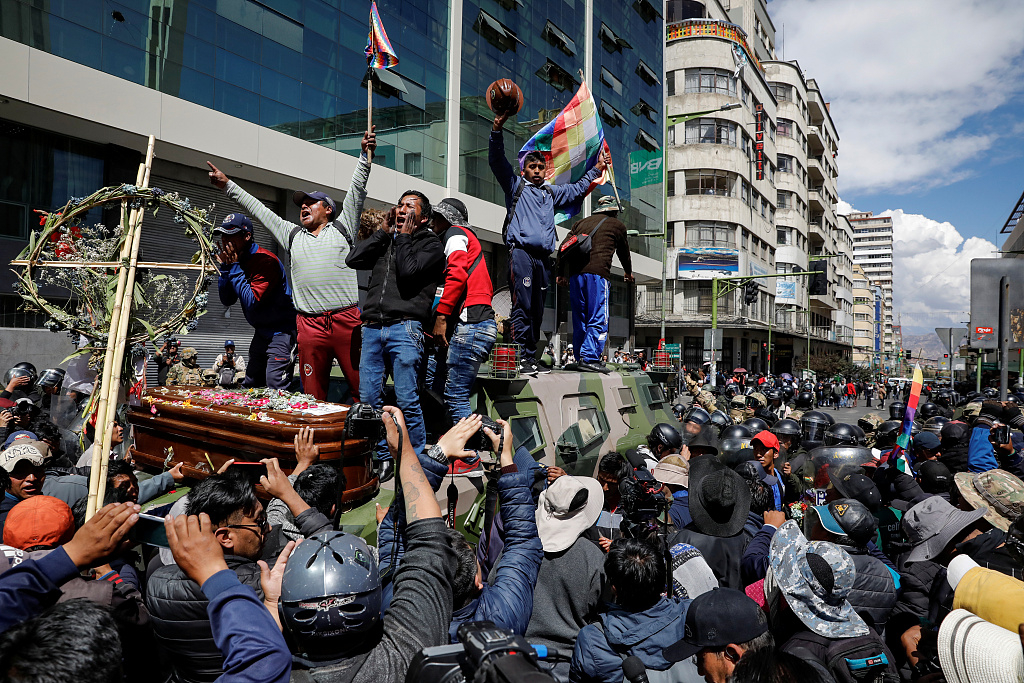Bolivia appointed its first ambassador to the United States in 11 years on Wednesday, officials said, as the interim government resets the country's foreign policy after the departure of Evo Morales.
Walter Oscar Serrate Cuellar has been given the key diplomatic posting, the foreign ministry announced on Twitter. The appointment has to be approved by Congress.
Cuellar previously served as Bolivia's ambassador and permanent representative at the United Nations, the ministry said.

Evo Morales waves as he leaves after a news conference in Mexico City, Mexico, November 20, 2019. /VCG Photo
Evo Morales waves as he leaves after a news conference in Mexico City, Mexico, November 20, 2019. /VCG Photo
Ex-Morales' officials take refuge in Mexican embassy in Bolivia
Some 20 former members of Morales' government have holed up in Mexico's embassy in La Paz, Bolivia's foreign minister said Tuesday, including four wanted for arrest.
Among them is Morales' former top minister Juan Ramon Quintana, who the caretaker government has accused of sedition and terrorism.
Morales, who fled to Mexico after being granted political asylum following his November 10 resignation, has been accused of the same crimes.
"We have a group of more or less 20 diplomatic asylum seekers in the Mexico (embassy) residence," foreign minister Karen Longaric told local media. "So far, arrest warrants have been issued for four of them."
There was no immediate response from the Mexican embassy for comment.
Longaric said she would inform the Mexican ambassador of the arrest warrants, so the embassy did not allow the four wanted officials to leave the country.

Bolivia's interim President Jeanine Anez holds the law for general election with Eva Copa, president of Boivia's Senate at the national congress in La Paz, Bolivia, November 24, 2019. /VCG Photo
Bolivia's interim President Jeanine Anez holds the law for general election with Eva Copa, president of Boivia's Senate at the national congress in La Paz, Bolivia, November 24, 2019. /VCG Photo
Strained ties
Relations between Bolivia and Mexico have been strained since Morales fled there amid violent street protests that erupted after the disputed October 20 election.
Morales, who had been seeking a fourth term after ruling for nearly 14 years, claimed victory. But opposition groups said the results were rigged.
Interim President Jeanine Anez, who took power after Morales quit, on Sunday signed a bill into law authorizing new elections that exclude the former leader.
A new ballot is seen as crucial to ending the unrest that has rocked the country for weeks and left dozens dead.

Supporters of Evo Morales react on top of an armored vehicle during a protest in La Paz, Bolivia, November 21, 2019. /VCG Photo
Supporters of Evo Morales react on top of an armored vehicle during a protest in La Paz, Bolivia, November 21, 2019. /VCG Photo
Fruitful talks
Talks between the caretaker government and opposition groups to restore peace appear to be bearing fruit.
Normal activities are resuming in La Paz and other cities with schools and businesses reopening this week and blockades of major transport routes mostly removed.
Federal prosecutors are investigating allegations that Morales, after arriving in Mexico, encouraged his supporters to maintain road blocks that caused severe food and fuel shortages in La Paz.
Interior Minister Arturo Murillo played a telephone recording to journalists last Wednesday, allegedly of Morales issuing instructions to a leader of the opposition movement in Bolivia.
"Don't let food into the cities, we're going to block, really encircle (the cities)," said the voice Murillo attributed to Morales.
Bolivia has lodged a formal protest to Mexico over Morales's remarks, saying they "contravened" his political asylum status.
(Cover: A Bolivian indigenous woman, a supporter of Evo Morales, gestures in front of soldiers during a protest against the interim government in La Paz, November 15, 2019. /VCG Photo)
Source(s): AFP